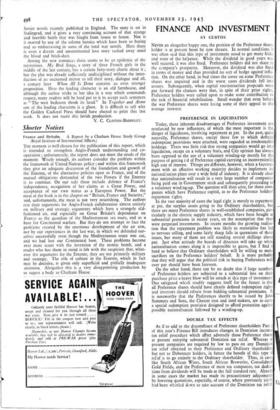FINANCE AND INVESTMENT
BY CUSTOS
NEVER an altogether happy one, the position of the Preference share- holder is at present beset by new threats. In normal conditions it was often said that this type of investment stood to get many kicks and none of the ha'pence. While the dividend in good years was well secured, it was also fixed. Preference holders did not share in the ccmpany's prosperity. Moreover, the dividend was also fixed in terms of money and thus provided no sort of hedge againsf infla- tion. On the other hand, in bad times the cover on some Preference shares was impaired and in the worst cases dividends fell into arrears. Subsequently, when capital reconstruction proposals were put forward the chances were that, in spite of their prior rights, Preference holders were called upon to make some contribution to the task of financial rehabilitation. Small wonder that even before the war Preference shares were losing some of their appeal to the average investor.
PREFERENCE IN LIQUIDATION
Today, these inherent disadvantages of Preference investment are reinforced by new influences, of which the most important is the danger of liquidation, involving repayment at par. In the past, quite naturally, Preference shares, except thoie few to which definite redemption provisions were attached, were regarded as irredeemable holdings. There was little risk that strong companies would go into liquidation, except on a voluntary basis, and. City opinion has always been opposed to the use of a voluntary winding-up merely for the purpose of getting rid of Preference capital carrying an inconveniently high rate of interest. Things are different, however, when a Govern- ment with an effective working majority decides to implement its nationalisation plans over a wide field of industry. It is already clear that nationalisation will result in a very large number of companies being paid out in Government stock and subsequently proceeding to a voluntary winding-up. The question will then arise, for those com- panies which have Preference capital, as to the Preference holders' repayment rights.
In the vast majority of cases the legal right is merely to repayment at par, the surplus assets going to the Ordinary shareholders, but there are many Preference shares in well-established companies, par- ticularly in the electric supply industry, which have been bought at substantial premiums in recent years, on the assumption that they were perpetual investments. In recent months the growing realisa- tion that the repayment problem was likely to materialise has led to nervous selling, and some fairly sharp falls in quotations of these issues, but many of them are still standing several shillings above par. Just what attitude the boards of directors will take up when nationalisation comes along it is impossible to guess, but I find it hard to believe that Ordinary shareholders will be willing to make sacrifices on the Preference holders' behalf. It is more probable that they will argue that the political risk in buying Preferences well over par should have been _foreseen.
On the other hand, there can be no doubt that if large numbers of Preference holders are subjected to a substantial loss on their purchase price a heavy blow will be struck at this type of investment. One safeguard which readily suggests itself for the future is that all Preference shares should have clearly defined redemption rights and investors should refrain from bidding substantial premiums. It is noteworthy that the Preferences shortly to be issued by John Summers and Sons, the Chester iron and steel makers, are to carry a special redemption provision designed to afford protection against possible nationalisation followed by a winding-up.
DOUBLE TAX EFFECTS
As if to add to the discomfiture of Preference shareholders Part 5 of this year's Finance Bill introduces changes in Dominion income- tax relief procedure which affect adversely those Preference shares at present enjoying substantial Dominion tax relief. Whereas at present companies are required by law to pass on any Dominion tax relief obtained to their Preference and Ordinary shareholders but not to Debenture holders, in future the benefit of this type of relief is to go entirely to the Ordinary shareholder. Thus, in cases like South African Wines, South African Breweries, Consolidated Gold Fields, and the Preference of most tea companies, tax deduc- tions from dividends will be made at the full standard rate. Already in some• cases the market has made its precautionary adjustments by lowering quotations, especially, of course, where previously yields had been whittled dcwn to take account cf the Dominion tax relief EL


























 Previous page
Previous page